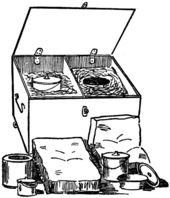Florence Petty
She was a broadcaster on food and budgeting in the late 1920s and early 1930s, on the 2LO radio station for the BBC, as part of the "Household Talk" series of programmes aimed at housewives.[1] The philanthropist Charles Booth, in his 1889 poverty map, Life and Labour of the People in London, classed much of Somers Town—located between Euston and St Pancras railway stations—as the two worst categories: "Very poor, casual.[3] In the early twentieth century Somers Town had high levels of poverty;[4] by the 1920s the area was "one of central London's most squalid slums", according to the architectural historian Roland Jeffery.[5] In 1924 Basil Jellicoe, the vicar of the local St Mary's Church, wrote of the area's overcrowding and poverty;[6] in 1930 one journalist described the housing as "vermin-ridden dens ... the worst hovels in London ... where mothers are afraid to put their children to bed for fear of rats and other vermin of all descriptions".[1][11] Her approach was to give six lessons to show how people could cook cheap yet nutritious meals; she discussed the family's domestic and financial situation and wrote a series of case notes for those she visited.[16] In the second edition, published in 1916, Charles Hecht, the secretary of the National Food Reform Association (NFRA)—the organisation that promoted higher standards in food production and whose aim was "to enlighten public opinion on matters of diet"[17]—wrote that: The heroine of the book, Florence Petty, has ... become a public possession, bringing to bear on the solution of national problems those rare gifts of heart and head and that unique experience which achieved such wonders ... in the homes of Somers Town.[30] Although the UK was nearly self-sufficient in goods such as milk and potatoes,[31] as the war progressed, consumers faced shortages or rising prices in butter, pork[32] and beef.The programme was a popular weekly broadcast aimed at housewives, with presenters that included Mrs Cottington Taylor, the Director of the Good Housekeeping Institute.[56] According to the historian Ellen Ross, Petty "pioneered the newly professionalising language of domestic management which was connecting rich and poor women all over Europe in the early twentieth century".[12] Perkins considers that the recipes and methods taught by Petty "prefigure Second World War efforts by the Ministry of Food to convince the populace that substitution of cheaper for familiar ingredients was worthy and even enjoyable".



Somers Townnorth Londonsocial workworking-classsuet puddingssanitary inspectorhayboxFirst World WarMinistry of FoodSecond World WarMontroseForfarshireSwanleyhorticultureTottenhamCharles Boothpoverty mapLife and Labour of the People in LondonBasil JellicoeSt Mary's ChurchChalton StreetEuston RoadOxford Dictionary of National BiographyNewport, Essexsocial reformerphilanthropistLady MeyerRoyal Society of MedicineThe TimesWestminster Health SocietyBoard of Tradecost of livingworking classpamphletThe Lancetcookery bookfood chemistKatherine BittingGood Housekeeping Institutecultural historianHampsteadJulie-Marie Strangesoda crystalsBitting, K. G.Hunter, MichaelMurray, TimStrange, Julie-MarieVernon, JamesDavin, AnnaEnglish cuisineRoman timesSausagesMiddle AgesUtilis CoquinarioThe Forme of CuryApple pieBanbury cakeCheesecakeCustardGame pieGingerbreadKippersMince pieMortisPease puddingPottageRichard PynsonThe Boke of CokeryThomas DawsonThe Good Huswifes JewellBlack puddingFruit foolPancakeSconesSyllabubTrifle (without jelly)Elinor FettiplaceReceipt BookGervase MarkhamThe English HuswifeRobert MayThe Accomplisht CookHannah WoolleyThe Queen-like Closet or Rich CabinetKenelm DigbyThe Closet OpenedBattalia pieCurrant bunQueen of PuddingsSponge cakeSussex pond puddingSweet and sourA Collection of Above Three Hundred Receipts in Cookery, Physick and SurgeryMary EalesMrs Mary Eales's ReceiptsThe Cooks and Confectioners DictionaryEliza SmithThe Compleat HousewifeHannah GlasseThe Art of Cookery Made Plain and EasyAnn CookMartha BradleyElizabeth RaffaldThe Experienced English HousekeeperThe English Art of CookeryThe Housekeeper's InstructorBread and butter puddingChristmas puddingChutneyCottage or Shepherd's pieCumberland rum nickyEccles cakeJellied eelsJugged hareKetchupMarmaladeParkinPiccalilliPork pieRoast beefSandwichScouseSuet puddingToad in the holeTrifle (with jelly)Welsh rarebit